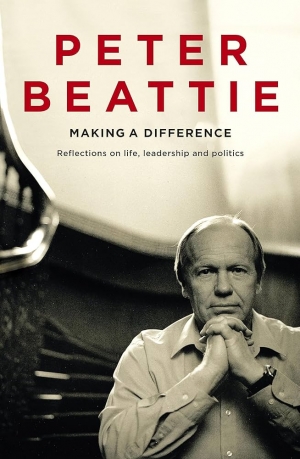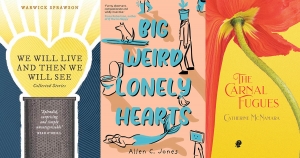Archive
John Wanna reviews ‘Making A Difference: Reflections on life, leadership and politics’ by Peter Beattie (with Angelo Loukakis)
If we adopt a charitable view about political memoirs, it is generally preferable that serving or newly departed politicians should pen their reminiscences. If they are any good, it is a bonus. To have their particular ‘take’ on events and personalities is a valuable addition to the historical record, even if such products err on the side of self-indulgence and egocentricity. Most politicians, unfortunately, take their secrets with them when they go. Moreover, to write, or collaborate in, one’s memoirs while still in public office is a remarkable achievement – undertaken only by Peter Beattie and Bob Carr in recent times.
... (read more)Advances | November 2005
Tuesday, 16 April 2024Brisbane crackers
The Brisbane Writers’ Festival has come and gone with great success and a sizeable audience. ABR sponsored a session: Chris Wallace-Crabbe, Tim Milfull, Brenda Niall and Peter Rose (photographed by Judith Potts below) discussed ‘The Art of Literary Criticism’. On the Sunday, Delia Falconer launched our October issue: ‘a cracker’, in her words. Describing ABR as ‘an ideal as much as a magazine, and an essential part of our literary culture’, Delia wished us ‘a long and argumentative life to come’ and urged everyone to subscribe. Many did rather than running the gauntlet of the four volunteers who assisted us throughout the festival, and to whom we are grateful.
... (read more)Bridget Griffen-Foley reviews ‘Singo: Mates, wives, triumphs, disasters’ by Gerald Stone
Most people, at least in Sydney, have a story to tell about ‘Singo’. As Gerald Stone comments towards the end of this independent but enthusiastic biography: ‘Anecdotes about John Singleton, even the most affectionate, tend to swing between total admiration and head-wagging disbelief. He leaves no one feeling neutral.’
... (read more)Last month it was autobiography’s turn, when David McCooey examined recent Australian memoirs (La Trobe University Essay, ABR, May 2006). Now it is biography’s turn: the genre will be the subject of the 2006 Australian Book Review/La Trobe University Annual Lecture, titled ‘Matters of Life and Death: The Return of Biography’. Our distinguished lecturer is Professor Ian Donaldson, Director of the ANU’s Humanities Research Centre, head of the latter’s new Biography Institute, and Consultant Editor for The Oxford Dictionary of National Biography. He is a general editor of The Cambridge Edition of the Works of Ben Jonson (due for publication in twenty-five volumes in 2007), and is completing a life of Jonson for OUP.
... (read more)Over the years the popularity of short fiction has fluctuated greatly, for mysterious reasons. A senior publisher once told me that publishers loved short fiction collections but that the reason they rarely published them was due to booksellers’ reluctance to support them. When I put this to a major bookseller, they claimed it was the other way around.
... (read more)Claire G. Coleman reviews ‘Always Will Be’ by Mykaela Saunders
There has been talk in recent years about so-called Indigenous Futurism. Referencing Afro-Futurism, futurist fiction that imagines a new postcolonial Africa, the Indigenous version imagines a postcolonial world for Indigenous people, a future where the world is the way it should always have been. One quirk, however, is that Indigenous Futurism leans on Indigenous notions of time, an eternal now in which past and future are mere directions. Writers of Indigenous Futurism know that it’s not only possible to imagine the future and the past at the same time, but that it is part of cultural practice.
... (read more)Jonathan Pearlman reviews ‘Beyond Chutzpah: On the misuse of anti-semitism and the abuse of history’ by Norman G. Finkelstein and ‘Israel’s Holocaust and the Politics of Nationhood’ by Idith Zertal
Beyond chutzpah is a long, tedious and barely readable rant, known less for its content than for the childless controversy it succeeded in provoking. Despite the promise of its subtitle, the book makes no meaningful attempt to describe or to understand the misuses of anti-Semitism. It is, instead, an obsessive assault on another book, The Case For Israel (2003), by the Harvard law professor Alan Dershowitz, who has gained prominence for defending O.J. Simpson, Mike Tyson, Klaus von Bülow and, more recently, Israel.
... (read more)It is two fathers punching each other in the footy sheds
shadows extending over the river flats,
over the bachelor nursing a long neck on his porch
over the epileptic twisting on the mechanic’s floor.
Patrick Lindsay’s Back from the Dead, one of the first books published on the Bali bombing, is primarily an evocation of the inferno and its aftermath, through the eyes of those who survived it. There is ‘Peter’s story’ (the author’s central focus), ‘Nashie’s story’, ‘Col’s story’ and so on, all interpolated with extensive quotes, mostly from the victims of the blast. Despite the painfully vernacular tone of the early chapters, this book is a good primer on the terrorist attack and its consequences.
... (read more)David Hansen reviews ‘Juan Davila with Guy Brett and Roger Benjamin’ by Juan Davila
Juan Davila is a major figure in contemporary Australian art. His fluent appropriations of other artists’ styles and motifs (all neatly numbered and labelled), combined with an assertive iconography of sexual desire and transgression (all bare thighs and thrusting tongues and mutant genitalia), made him one of the most interesting painters of his generation – the postmodern, theoretical, Art and Text push of the 1980s. He has represented his country in northern hemisphere exhibitions from Paris to Banff, and has maintained strong connections across his native Latin America. The New South Wales Vice Squad’s infamous impounding of Stupid as a painter in 1982 cemented the artist’s ‘bad boy’ reputation with the general public, as well as within the art industry, while his painting of a semi-nude, hermaphrodite Simón Bolivar giving the finger actually created a full-scale diplomatic incident involving Chile, Venezuela, Colombia and Ecuador. Davila’s regular output of polemical essays, his gloriously rude lampoons of political leaders and his more recent, sober protests against refugee detention have ensured his work has a place in public discourse. A comprehensive survey is long overdue.
... (read more)






